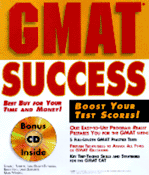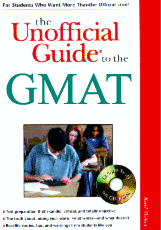What is the
GMAT?
Who has to take the GMAT?
Can I "fail" one of these tests?
How is the GMAT scored?
What is a low score? A high score?
For how long is the GMAT valid?
How do I reserve a time and place to take the GMAT test?
How much does the GMAT cost?
Can I take the test again if I do badly?
Is the GMAT easier than the GRE?
What the examiners and business schools looking for in the Analytical Writing section?
What do the business schools receive from ETS?
Is GMAT computerised?
What materials can you use in the GMAT?
What is the
GMAT?
The Graduate Management Admission Test (GMAT) is a test designed by the non-profit organization ETS (Educational Testing Service ), and administered
worldwide by Sylvan Editorial Services. The GMAT is an exam required by most good MBA programs, and some Economics and Finance departments, around the world.
Who has to take the
GMAT?
Just about anyone interested in doing an MBA at a good university.
Can I "fail" one of these tests?
No. Most schools do not have a minimum score for the GMAT. But you can get a low score.
How is the GMAT scored?
The GMAT is scored from 200 to 800, with 200 being the worst possible and 800 a perfect score. Within that score, the verbal and quantitative are scored separately. You are also given a percentile score for each area as well as overall. The percentiles tell you how you compared with other candidates. For example you could receive scores of 45 in the Verbal area (92nd percentile), 32 in the Quantitative area (57th percentile) to give you an overall score of 590 (68th percentile).
What is a low score? A high score?
500 is the median score, that is to say that 50% of everyone taking the test scores 500 or less and 50% score 500 or more. Taking into account that everything is relative, anything under 500 is low. Anything over 600 is pretty good (i.e. it is better than nearly 80% of the candidates).
For how long is the GMAT valid?
The GMAT is valid for 5 years.
How do I reserve a time and place to
take the GMAT test?
You will have to call ETS ( Educational Testing Service ) in the States to reserve your test. You should have a credit card on hand to pay the test fee and two or three dates that would suit you to take the test. The GMAT should be available almost every working day of the year and if you book two weeks in advance there should be no problem getting the date you want. In the U.S., U.S. territories, Puerto Rico and Canada call 1-800-GMAT-NOW or visit http://www.gmat.org/gmat_reghowUS.html. For those outside the U.S. visit http://www.gmat.org/gmat_reghowRRC.html to find the registration centre that serves your part of the world.
How much does the GMAT cost?
The GMAT test fee is $150 (US) in the U.S., U.S. territories and Puerto Rico, $195 (US) elsewhere and if this seems a little steep just remember that this is a monopoly.
Can I take the test again if I do badly?
Of course you can, if you have the $150/$190 to spare. According to the ETS rules you will have to wait until the next
calendar month before you can retake it. It is important to remember that if you take the GMAT more than once then business schools will receive all your scores. Usually they will only consider your best score but there is no guarantee of that. Ideally you will prepare well for the test and only take it once. You should only take it again if you feel sure you will improve your score by a significant amount.
Is the GMAT easier than the GRE?
They are both tough. You should choose the test that you need and not the test that you think is easiest. As a guide, the GMAT is almost exclusively for MBA programs and the GRE for other post graduate programs.
What the examiners and business schools looking for in the Analytical Writing section?
The essays are marked on a scale of 1-6. For the most part the ETS evaluators are looking for clear organisation and good
grammar. Since February 1999 ETS has begun to use a computer to mark the essays meaning that your essay is given both a mark by the computer and by a human reader. If these two marks do not correspond it will receive third evaluation from another reader. This means that the ideas in the essay are less important than ever.
For business schools the essays are far more important for evaluating students for whom English is not their native language. Business schools will get a copies of your essays as well as your mark. Some schools will actually read your essays in which case the ideas will be important as well as the structure and grammar.
What do the business schools receive from
ETS?
The schools will receive the essays, essay scores, verbal scores, quantitative scores and overall scores that you obtained in the last 3 test you took in the last 5 years. They will also get a record of any test scores you cancelled.
Is GMAT
computerised?
Yes, the GMAT is now computer administrated which means that you will be answering the questions on a computer. Test Tutor's questions are designed to be very similar in appearance to those on the real
GMAT.
What materials can you use in the
GMAT?
You will get pencils and as much paper as you need. You can and should make notes to help you answer the questions in all sections of the test. You will not be able to use a dictionary or a calculator.
|

